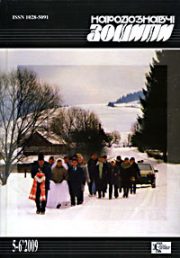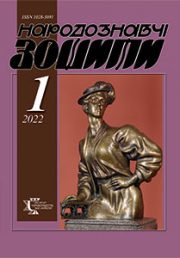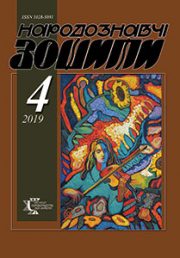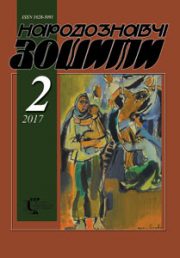The Ethnology Notebooks. 2023. № 4 (172), 917—932
UDK [061.22:027.9](477.83-22Дуліби):930.2
DOI https://doi.org/10.15407/nz2023.04.917
TARAS Yaroslav
- ORCID ID: https://orcid.org/0000-0001-7241-9466
- Doctor of Historical Sciences, Professor,
- Institute of Ethnology of the National Academy of Sciences of Ukraine,
- Head of the Modern Ethnology Department,
- 15, Svobody Avenue, 79000, Lviv, Ukraine,
- Contacts: e-mail: etnomod@ukr.net
Abstract. The purpose of the publication is to characterize the cultural and educational activity of the reading room «Prosvita» in the village of Duliby, Stryi district from 1898 to 1944, to outline its social and political work during the Austro-Hungarian, Polish, and German occupations, to show its influence on the consciousness of Duliby residents, to highlight the activities of its founders, heads and members.
The object of the study is the «Prosvita» reading room in the village of Duliby and the features associated with it; subject — general circumstances and directions of activities of the “Prosvita» reading room.
Research methods — comparative-historical analysis, used to reconstruct the activities of the «Prosvita» reading room from its foundation to the end of its work in 1944; comparative-typological for verification of the involved information.
The history of the establishment and activity of the reading room of the «Prosvita» Society in the village of Duliby, Stryi district, from 1898 to 1944 is described; distinguished role in the foundation of the reading room «Prosvita» in the village of Duliby by Ye. Olesnytskyi, O. Bobykevych; followed the activities of the reading room, when its heads were Fathers Lev and Petro Shankovskyi and Father M. Matkovskyi; its leadership before the First World War, in the 1920s and 1930s and during the Second World War is presented; the participation of Duliby residents in the activities of the reading room is highlighted on the basis of lustrations and reports for 1899, 1903, 1908/1909, 1925, 1933/1934;analyzed reading room literature; it was found out which books were read the most, how the library fund was replenished; the connection of the reading room with the «Prosvita» branch in Stryi, the main center of «Prosvita» in Lviv, is outlined; considered: the construction of the reading room, the work of its amateur group, choir, kindergarten, cooperation with the «Native School», «Silsky Gospodar», «Rusalka» cooperative, «Union of Ukrainian Women», «Dobrobut» union, «Sokil» society, Raiffeisen cash office.
Keywords: «Prosvita» Society, Ukrainian Educational Society, reading room of the «Prosvita» Society in the village of Duliby, E. Olesnytskyi, O. Bobykevych, Lev and Petro Shankovskyi, M. Matkovskyi.
Received 17.07.2023
REFERENCES
- Pelenska, I. (1990). A survey of the schools in the Stryi region. The Stryi Region: Stryi, Skole, Bolekhiv, Dolyna, Rozhniativ, Zhuravno, Zhydachiv, Mykolaiv n/Dn. (Vol. 1, pp. 390—403). Shevchenko Scientific Society; Stryishchyna Committee. New York [in Ukrainian].
- Romanyuk, V. (Ed.). (2009). «Prosvita». The Stryi Region (Book 1: Pages of history, pp. 122—154). Stryi: Shchedryk [in Ukrainian].
- Kovba, Zh. (1993). «Prosvita» — light, knowledge, goodness and will of the Ukrainian people (To the 125th anniversary of the foundation). Drohobych: Renaissance [in Ukrainian].
- Central State Historical Archives, Lviv. Fund 348. Description 1. Case 2350 [in Ukrainian].
- Olesnytsky, Ye. (2007). Pages from my life: (reprint edition in 1935 with additional material). Stryj: Schedryk [in Ukrainian].
- Shankowsky, L. (1990). History outline of the Stryi region. The Stryi Region: Stryi, Skole, Bolekhiv, Dolyna, Rozhnitiv, Zhuravno, Zhydachiv, Mykolaiv n/Dn. (Vol. 1, pp. 69—192). New York: Shevchenko Scientific Society; Stryishchyna Committee [in Ukrainian].
- Mandryk, M. (1998). Pages of the history of «Prosvita» of the Stryi region. Stryi: «Prosvita» Society; Shchedryk [in Ukrainian].
- Haliv, M., & Batiuk, T. (2014). The «Prosvita» Society activity in Stryi district during the German occupation period (1941—1944): according the periodicals. Current issues of the humanities: inter-university collection of scientific works of young scientists of the Ivan Franko State pedagogical university of Drohobych (Issue 9, pp. 11—23). Drohobych [in Ukrainian].
- Persky, S. (1932). Popular history of the «Prosvita» Society in Lviv: with illustrations. Lviv: Published by the «Prosvita» Society [in Ukrainian].
- Ivanychuk, R., Komarynets, Т., Melnyk, І., & Seredniak, А. (1993). Essay on the history of «Prosvita». Lviv; Krakow; Paris: Prosvita [in Ukrainian].
- Mandryk, M. (2010). From the history of «Prosvita» in Stryi region. Ukraine: Cultural Heritage, National Identity, Statehood (Vol. 19, pp. 278—286) [in Ukrainian].
- (1898). Dilo, 243 [in Ukrainian].
- (1907). Sokil holiday in Stryi. Svoboda. Political, educational and economic magazine, 38, 4—5 [in Ukrainian].
- Kozak, E. (1992). How we mined the artillery barracks. In one’s own house, one’s own truth: collection of local history articles (Pp. 72—73). Kyiv; Stryi [in Ukrainian].
- Fur, B. (1992). The same Eco. In one’s own house, one’s own truth: collection of local history articles (P. 71). Kyiv; Stryi [in Ukrainian].
- Member (1941). Performance of the play «About what the sawdust rustled». Stryiski visti, 28, 4 [in Ukrainian].
- Drobinyak, D. (1941). Foundation of the squad of the «Sich» society in Duliby. Stryiski visti, 12, 4 [in Ukrainian].







